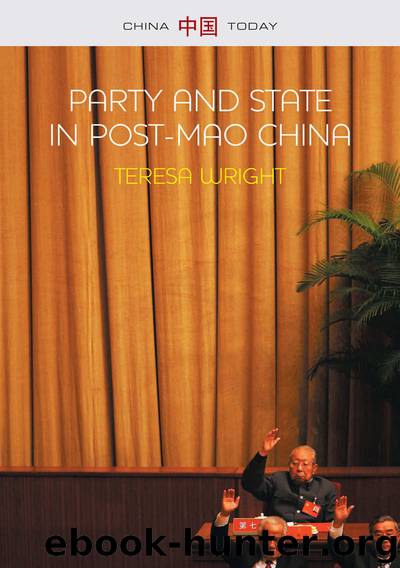Party and State in Post-Mao China (China Today) by Teresa Wright

Author:Teresa Wright [Wright, Teresa]
Language: eng
Format: azw3
Publisher: Wiley
Published: 2015-05-05T16:00:00+00:00
Farmers
Farmers comprise another key social group whose support (or at least tolerance) is necessary in order for China's governing regime to remain stable. The importance of farmers lies partly in their numbers: as of 2013, just under half of China's population lived in the countryside, engaged in agricultural pursuits. Yet farmers' importance also lies in the history of China and the CCP: peasants formed the backbone of the communist rebellion that brought the CCP to power, and farmers have been at the forefront of perhaps a majority of the “mass disturbances” that have been prevalent in China since the 1990s. Central authorities are aware of these realities, and as a result have tried (albeit with mixed success) to respond satisfactorily to farmers' grievances and attend to their basic needs. Yet many farmers remain dissatisfied with the political status quo, and collective protests continue to arise in China's countryside.
The general situation of China's farmers mirrors that of rank-and-file private sector workers. As discussed above, during the Maoist period, farmers (as rural hukou-holders) were forced to live in the countryside, and were told by Party-state authorities what to grow, and for how much it could be sold. Most lived in abject poverty; at times, farmers suffered to the point of starvation. In the post-Mao period, the central Party-state's policies toward rural farmers have changed dramatically, in a way that has worked immensely to their benefit – particularly relative to the Mao era. Yet, farmers have continued to endure corrupt and abusive practices on the part of local political authorities. Further, their material improvement has not been steady over time or consistent geographically, and they have continued to have a far lower standard of living than do those who hold urban residence permits.
Overall, the economic freedom of farmers has increased dramatically relative to the Maoist period, and their material status has improved substantially. Whereas during the Maoist period all land was collectivized and all agricultural products were bought and sold through the state-planned economy, in the post-Mao period rural residents have been allowed to lease their own plots of land (for 30-year, renewable terms); to determine (in consultation with political authorities) what to produce from the land; and to sell their produce in free markets. Central authorities also have allowed non-agricultural local government-affiliated rural enterprises (known as Township and Village Enterprises, or TVEs) to emerge, which have offered local wage work to rural residents otherwise engaged in agriculture – work that typically has been more lucrative than agriculture. Similarly, with the loosening of internal migration restrictions and the rise of private enterprises in the cities, former farmers have moved to the city, earning wages and sending their savings back to their families still living in the countryside. Starvation is no longer a possibility. In this sense, China's post-Mao political system has satisfied farmers' most basic human need to survive – something that the Maoist government at times failed to do.
Beyond this, however, during the post-Mao period the living conditions of farmers have varied according to geographic location, and have waxed and waned over time.
Download
This site does not store any files on its server. We only index and link to content provided by other sites. Please contact the content providers to delete copyright contents if any and email us, we'll remove relevant links or contents immediately.
| Anthropology | Archaeology |
| Philosophy | Politics & Government |
| Social Sciences | Sociology |
| Women's Studies |
The Secret History by Donna Tartt(18797)
The Social Justice Warrior Handbook by Lisa De Pasquale(12114)
Thirteen Reasons Why by Jay Asher(8761)
This Is How You Lose Her by Junot Diaz(6738)
Weapons of Math Destruction by Cathy O'Neil(6109)
Zero to One by Peter Thiel(5655)
Beartown by Fredrik Backman(5570)
The Myth of the Strong Leader by Archie Brown(5393)
The Fire Next Time by James Baldwin(5219)
How Democracies Die by Steven Levitsky & Daniel Ziblatt(5106)
Promise Me, Dad by Joe Biden(5063)
Stone's Rules by Roger Stone(5004)
A Higher Loyalty: Truth, Lies, and Leadership by James Comey(4818)
100 Deadly Skills by Clint Emerson(4817)
Rise and Kill First by Ronen Bergman(4673)
Secrecy World by Jake Bernstein(4612)
The David Icke Guide to the Global Conspiracy (and how to end it) by David Icke(4591)
The Farm by Tom Rob Smith(4413)
The Doomsday Machine by Daniel Ellsberg(4389)
